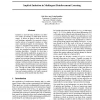117 search results - page 21 / 24 » Self-evaluated Learning Agent in Multiple State Games |
ICML
1999
IEEE
14 years 8 months ago
1999
IEEE
Imitation is actively being studied as an effective means of learning in multi-agent environments. It allows an agent to learn how to act well (perhaps optimally) by passively obs...
ATAL
2010
Springer
13 years 8 months ago
2010
Springer
Learning, planning, and representing knowledge in large state t multiple levels of temporal abstraction are key, long-standing challenges for building flexible autonomous agents. ...
IJCAI
2007
13 years 8 months ago
2007
We introduce an approach to autonomously creating state space abstractions for an online reinforcement learning agent using a relational representation. Our approach uses a tree-b...
ATAL
2007
Springer
13 years 11 months ago
2007
Springer
We contribute an approach for interactive policy learning through expert demonstration that allows an agent to actively request and effectively represent demonstration examples. I...
ATAL
2008
Springer
13 years 9 months ago
2008
Springer
The application of reinforcement learning algorithms to Partially Observable Stochastic Games (POSG) is challenging since each agent does not have access to the whole state inform...

